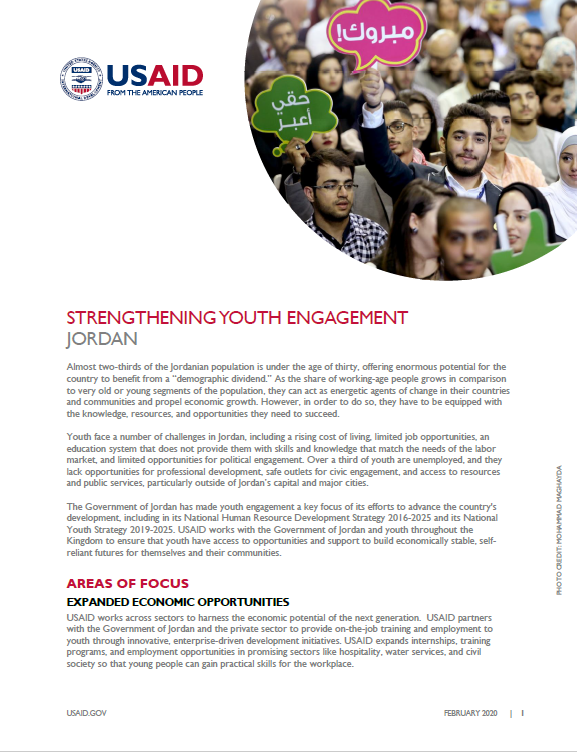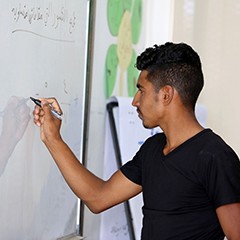Speeches Shim
BACKGROUND
Almost two-thirds of the Jordanian population is under the age of thirty, offering enormous potential for the country to benefit from a “demographic dividend.” As the share of working-age people grows in comparison to very old or young segments of the population, they can act as energetic agents of change in their countries and communities and propel economic growth. However, in order to do so, they have to be equipped with the knowledge, resources, and opportunities they need to succeed.
Youth face a number of challenges in Jordan, including a rising cost of living, limited job opportunities, an education system that does not provide them with skills and knowledge that match the needs of the labor market, and limited opportunities for political engagement. Over a third of youth are unemployed, and they lack opportunities for professional development, safe outlets for civic engagement, and access to resources and public services, particularly outside of Jordan’s capital and major cities.
The Government of Jordan has made youth engagement a key focus of its efforts to advance the country's development, including in its National Human Resource Development Strategy 2016-2025 and its National Youth Strategy 2019-2025. USAID works with the Government of Jordan and youth throughout the Kingdom to ensure that youth have access to opportunities and support to build economically stable, self-reliant futures for themselves and their communities.
AREAS OF FOCUS
Strengthening Youth Engagement ![]() (pdf - 236k)
(pdf - 236k)
Expanded Economic Opportunities
USAID works across sectors to harness the economic potential of the next generation. USAID partners with the Government of Jordan and the private sector to provide on-the-job training and employment to youth through innovative, enterprise-driven development initiatives. USAID expands internships, training programs, and employment opportunities in promising sectors like hospitality, water services, and civil society so that young people can gain practical skills for the workplace.
Strong Civic Engagement
In order to encourage youth political participation, USAID partners with the Government of Jordan and civil society to provide civic engagement curricula in schools and universities and teach youth about electoral campaigning. In addition, USAID and its partners strengthen access to youth-focused support services and help youth conduct initiatives and advocacy campaigns that improve their communities, fostering a sense of agency and local ownership and giving them the skills to lead change in their communities.
Access to Quality Education
Together with the Ministries of Education and Public Works and Housing, USAID builds and renovates schools with youth facilities, trains teachers, and strengthens parental engagement in schools to give youth access to safe and inclusive learning spaces. USAID also provides non-formal education to out-of-school youth and builds awareness of healthy lifestyles, family planning, and reproductive health so that youth are empowered to take control of their futures.
NOTEWORTHY ACHIEVEMENTS
-
Since 2016, more than 5,000 youth have graduated from professional training programs linked to full-time employment that were launched by USAID in partnership with the private sector. In 2019, the Jordan Hotel Association took on full management of one of these programs – Pathways to Professionalism – offering multiple levels of nationally certified on-the-job training for hospitality professionals in more than 30 hotels throughout Jordan.
-
Over 75,000 students have participated in civic education and advocacy training from USAID. From 2012 to 2019, grade-school and university students from over 300 schools and 20 universities drew on this training to conduct almost 900 civic initiatives on issues like water pollution, early marriage, vandalism of cultural heritage sites, and lack of school heating.
-
Around 450 students outside of formal schooling have earned their tenth-grade equivalency certificates through USAID non-formal education centers, enabling them to pursue higher education, vocational training, or better employment. With 40 USAID non-formal education centers established throughout Jordan in partnership with the Ministry of Education as part of a nationwide program, youth in the most underserved areas of the country have increased access to opportunities for continuing their education.
-
In 2019, more than 3,000 youth identified the challenges they faced, developed recommendations, and presented them to government officials through the “Jordan We Want 2030”, a national dialogue launched by USAID in partnership with the Government of Jordan and civil society. The initiative, endorsed by the Ministry of Youth, provided a nationwide platform for youth to express their hopes for Jordan’s future to the government and increase their investment in it.




Comment
Make a general inquiry or suggest an improvement.